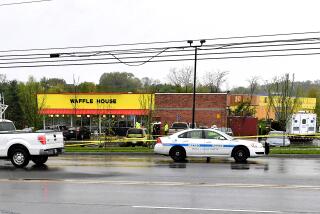Liberals Want a Racial Monologue . . .
- Share via
In an editorial comment on the Clinton race initiative in the New York Times headlined “The Honest Dialogue That Is Neither,” the paper quoted a political scientist as saying that blacks were not participating frankly because they knew that if they charged whites with racism “that sort of bluntness would end the conversation” and that whites did not “want to talk openly about their suspicions that blacks may be genetically inferior.”
Far from explaining why Clinton’s dialogue cannot get off the ground, this “analysis” merely compounds the problem. Clinton liberals think that the real problem is white racism. Their idea of a dialogue is that blacks should express displeasure at a status quo that denies them equality, while whites who are in denial about this reality should come to their senses and express contrition. That is why Clinton has stacked his race commission with racial leftists who have excluded such opponents of affirmative action as Ward Connerly. That is why when Clinton invited Abigail Thernstrom, another opponent of racial preferences, to his town meeting, he did so solely for the purpose of bullying her into submission.
“Abigail, do you favor the U.S. Army abolishing the affirmative action program that produced Colin Powell? Yes or no?”
Faced with this presidential demarche, Thernstrom stuttered that she didn’t think affirmative action preferences were responsible for Powell’s success. To which Clinton retorted: Well, Colin Powell thinks they were. This was two lies in one. In his book, Powell says that his success was not owed to affirmative action preferences. The U.S. Army has no affirmative action program of the kind opposed by Connerly and Thernstrom and therefore no astronomical dropout rates of underqualified blacks as do the objectionable affirmative action programs in universities.
The reason that there won’t be a dialogue on race this season is not because there is only one reasonable, moral side to the questions at hand but because liberals are unable to face the fact that there is another. Liberals are in a state of profound denial of the realities that fuel the racial issue: the current failure of some sections of the black community and other minority communities to meet the standards that have been set for everyone else and a subtext of anti-white racism, which allows the white community to be made the scapegoat for minorities’ failure.
An example of this denial was on display in the Los Angeles Times, where civil rights activist Roger Wilkins described the “essence” of the position taken by opponents of affirmative action as believing “that the civil rights movements of the 1950s and ‘60s left us with a degree of racism so negligible that the only things now threatening our racial tranquillity are race-conscious remedies, particularly affirmative action.” To disabuse this benighted crew of its complacency, Wilkins reminds us that “real gaps in income, wealth, education, health, housing opportunities and employment still remain, at all education levels, and are especially acute for the least skilled. And, tragically, more than 40% of black children are growing up in poverty.”
This is the essence of liberal thinking. If there is a gap between blacks and whites that is detrimental to blacks, then whites must be responsible. But the facts show otherwise. Eighty-five percent of black children who are poor are living in single-parent families. Statistics show that six out of seven children raised by single mothers will be poor regardless of race. In other words, there is no real gap once behavior is taken into account. The same can be said for virtually every other disparity trotted out by liberals to demonstrate the “institutional racism” alleged to be responsible for the failure of some blacks.
These are the realities that liberals cannot face: Blacks are underrepresented at elite universities because their test scores are abysmal. Blacks are incarcerated in prisons in staggering numbers because they commit crimes in staggering disproportion to their representation in the population. Those blacks who are chronically unemployed are unemployed not because there are no jobs nor because they are barred from jobs by their skin color but because they are unemployable: They do not seek work as avidly as other groups do; they make their neighborhoods too dangerous for businesses to establish operations; and they do not acquire educational skills or work habits necessary for employment.
These are the hard truths that the Clinton liberals don’t want to face. But they need to be faced if the black underclass is going to take advantage of the same opportunities that a thriving black middle class already has embraced. That is what a real dialogue on race would address. And that is the reason that Clinton’s conversation about race is only a dialogue of the deaf.
*
David Horowitz is the author of “Radical Son” and president of the Los Angeles-based Center for the Study of Popular Culture. E-mail: [email protected]
More to Read
Get the L.A. Times Politics newsletter
Deeply reported insights into legislation, politics and policy from Sacramento, Washington and beyond. In your inbox twice per week.
You may occasionally receive promotional content from the Los Angeles Times.










